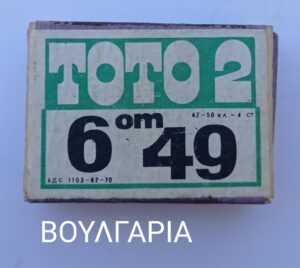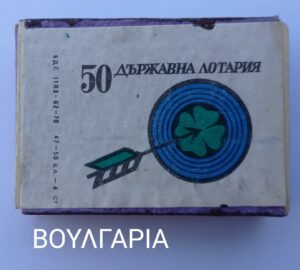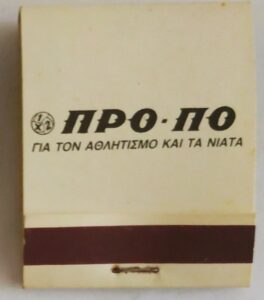
 Lotteries and gambling in general, especially in the past, were one of the relatively common depictions in matchboxes. There are several individual Greek matchboxes on the subject of lotteries, the first was released in the 1950s, but also a series of Greek monopoly released in 1981 by “Velpex”. Also with the same theme there are matchboxes mainly of previous decades from several countries of western or even eastern Europe but also from various countries of the world.
Lotteries and gambling in general, especially in the past, were one of the relatively common depictions in matchboxes. There are several individual Greek matchboxes on the subject of lotteries, the first was released in the 1950s, but also a series of Greek monopoly released in 1981 by “Velpex”. Also with the same theme there are matchboxes mainly of previous decades from several countries of western or even eastern Europe but also from various countries of the world.
Nowadays gambling has evolved and expanded. In addition to lotteries and PROPO, they created new games, bets, lotto, jokers, scratch cards and other products. In fact, electronic gambling, which is highly promoted, has brought casinos to our homes and offices with the opportunity to participate in various betting games that have been invented from the couch of your home.
Gambling is known to develop into a pathological condition, an addiction that is characterized and it is a disease. In fact, the symptoms of addiction are sometimes difficult to detect and can only be perceived by those who are very closely associated with the player. Generally, signs of gambling addiction appear when the player’s behavior affects his / her daily life and relationships.
characterized and it is a disease. In fact, the symptoms of addiction are sometimes difficult to detect and can only be perceived by those who are very closely associated with the player. Generally, signs of gambling addiction appear when the player’s behavior affects his / her daily life and relationships.
The phrase, which is written in small print in advertisements or is said very quickly: “Frequent participation carries risks of addiction and loss of property” does not seem to have reduced either the number of gamblers or the amount spent on gambling. In times of economic crisis, gambling becomes more popular, because it creates the hope for a sudden and easy enrichment.
In Greece, OPAP, which was a public and highly profitable company, in 1999 was transformed into a Société Anonyme, privatized, and the participation of the State was  gradually reduced to about 33%. On October 11, 2013, the State sold its remaining stake and its place was taken by the investment scheme Emma Delta Hellenic Holdings LTD. The well-known Minister of Finance of that period, G. Stournaras, cited as an argument for the sale of the public share the amount of 152 million euros that had to go into state coffers to be returned to the European Union and the International Monetary Fund. It is noteworthy that based on data from previous years and on the ranking based on sales (turnover), it was the third largest Greek company, after Hellenic Petroleum and PPC. In 2012 the company closed with a turnover of 3.972 billion euros and profits of 505 million euros. That is, the public share, from a highly profitable company, was sold in an amount that corresponds to less than the annual profits that the public had from this company! The privatization of this public property gave the opportunity for certain profits and was for the benefit of the profitability of the big capitalist groups.
gradually reduced to about 33%. On October 11, 2013, the State sold its remaining stake and its place was taken by the investment scheme Emma Delta Hellenic Holdings LTD. The well-known Minister of Finance of that period, G. Stournaras, cited as an argument for the sale of the public share the amount of 152 million euros that had to go into state coffers to be returned to the European Union and the International Monetary Fund. It is noteworthy that based on data from previous years and on the ranking based on sales (turnover), it was the third largest Greek company, after Hellenic Petroleum and PPC. In 2012 the company closed with a turnover of 3.972 billion euros and profits of 505 million euros. That is, the public share, from a highly profitable company, was sold in an amount that corresponds to less than the annual profits that the public had from this company! The privatization of this public property gave the opportunity for certain profits and was for the benefit of the profitability of the big capitalist groups.
Now of course one can ask why the New Year lottery is called “state”, since it is not! They want the entire pie and the dog full (Greek idiom, which in English means you can’t have your cake and eat it too) They retain the title “state” and mislead those who place their hopes in the goddess of fortune, because they simply want to gain from the credibility and solvency of the state.
They want the entire pie and the dog full (Greek idiom, which in English means you can’t have your cake and eat it too) They retain the title “state” and mislead those who place their hopes in the goddess of fortune, because they simply want to gain from the credibility and solvency of the state.
Whichever way you look at it, the game is set up!

